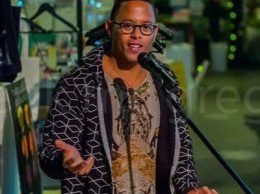Access Denied: The Ins/Outs of “What’s Down There”
By Monica R. Miller
Having just finished an article on LGBTQ teens and the church for The African American Lectionary (Vanderbilt University), I’ve been thinking a lot about how slogans such as ‘homophobia’ so easily roll off the tongue of the liberal lexicon—but yet words such as transphobia and intersex-phobia are almost nonexistent. While the fight against homophobia is in no way over—the struggle for the recognition of other “isms” in society is seldom taken up in the American imagination. On the academic front—intellectuals have become rather comfortable with the deployment of seemingly trendy postmodern signifiers such as fluidity, spectrum, gender trouble, performativity, intersectionality and so on—linguistic abstractions sometimes obscure the nitty-gritty about what we are really thinking about gender and sexuality.
The story of Caster Semenya, the South African runner and world champion whose gender was up for heated debate when suspicion around her sex ran rampant around the world, highlighted the public’s fascination with gender, sex, biology and sexuality. Underneath the public anxiety and suspicion was a need to know, a desire for medical confirmation of what was “down there” between Semenya’s legs. Needless to say—Semenya’s intersex body produced “gender trouble” for the world—bursting the bubble on society’s either/or myopia. Why are we, as a public, so fascinated with and by genitalia—the “what’s between our legs” (otherwise known by J. Mase III as the ‘sexy bits’) of our bodies? To explore this issue a bit more, I interviewed J. Mase III, a trans performance artist and Acting Director of the Attic Youth Center’s Bryson Institute in Philadelphia, Pennsylvania who has given hundreds of trainings on issues affecting the LGBTQIA (lesbian, gay, bisexual, transgender/transsexual, questioning, intersex, ally) community.
To begin, how do you understand gender and genitalia in the LGBTQIA community and how do you personally identify?
I understand gender and genitalia in the LGBTQIA community as the stuff our civil rights are made of. When you think about the ways (non-ally) people react to LGBTQI people they’re reacting to someone of some gender/body doing something their gender/body shouldn’t. They are not simply wondering who likes who, but what are the mechanics of how y’all get busy? Because we live in a very erotophobic society, the fear of what LGBTQI folks are doing with their own ‘sexy bits’ has been leading to a lack of rights. I identify as a big ‘ol genderqueery, post-dyke, transfag. Take your time with it. I made it myself.
Why do you think we, as a society, are becoming more comfortable with talking about homophobia yet hesitant to talk about trans and intersex phobias?
I remember reading somewhere that the human brain could only hold a maximum of 7 thoughts at a time. So, you gotta think, grocery lists, kids, school, where you left your keys, racism, ableism, homophobia, and whoa, by the time you get to trans/intersex phobias, you’ve already run out of room! It’s like when you go to a rally for human rights and by the end there’s all this trash around from the thousands of people that were there as if thinking simultaneously about the environment would have been too much. We are in a politically correct/multiculturalism overload at times it seems and people are having a hard time keeping up. I don’t blame them entirely, but I do think it’s important that we keep our brain muscles moving forward (or be fish food).
One of my very favorite television shows is guilty of just this sort of thing. I am obsessed with Glee. I can’t help it; you’d be crazy not to be. All the singing, dancing…Anyway, this season is all dedicated to Kurt, an openly gay, fashionable gay boy who roams the halls in nothing short of runway attire. While it seems that even Fox (yes, Fox!!!) can see that it is wrong to be mean to the gays, what they don’t get is how setting up jokes about the butchest, biggest, woman on the block (the newly appointed) coach Bieste is also dangerous to the queers. A friend of mine that sees herself as an ally watched an episode of Glee with me, saw Bieste (Dot-Marie Jones) and shrieked “Do you think she’s a man?!?!” What my friend was really asking was, “What’s in that person’s pants and why can’t I tell?” We’re only concerned with fighting for the rights of people we understand. Right now, we have come to a place socially where many (most) of us understand the concept of love and how regardless of who we fall in love with, how important that feeling is. That’s a very basic idea. Another basic idea is our concept around gender. Penis = boy = hunter. Vag = girl = gatherer. We can’t think about an idea that turns our basic most infallible ideas out and makes our heads hurt. Trans/intersex phobias are just too much.
What were your thoughts on how the public reacted to the story of Caster Semenya? What did the public really want to know about her?
I was very disgusted with the way people reacted to Semenya, but not surprised. It seems that whenever the concept of intersexuality or transness comes up in a public forum that people feel as if they have a right to know what someone’s status is on their (the public’s) terms even if they have yet to develop the mental and emotional faculties to understand and interpret that information. In the world of sports what has come up for women athletes such as Semenya, Santhi Soundarajan, and others is this continuation of policing women’s bodies. I wonder how many perceivably male athletes get gender tested? Many people will ask questions like “Is she a man?” Well, if you start with a yes/no question like that, you’ve already screwed up your test results. The truth is intersex people exist and if an athlete came out as intersex in 2011 there is nowhere for them to play sports. We don’t even give them the space. So why even bother asking the question if socially we’re that irresponsible with the knowledge?
Can you speak to some of the issues that Trans and Intersex folks face among the larger community?
I think the major issues for trans and intersex people are the pathologizing and medicalization around their identities. Homosexuality has been out of the running as a mental disorder for decades. Yet, many transpeople are cornered into being diagnosed with Gender Identity Disorder (GID) in order to be recognized as the gender they identify as. Even going back to the case of Semenya and intersex people in sports (and other institutions) the International Olympic Committee has recommended that intersex people be allowed to participate in sporting events, so long as they get their ‘condition’ treated. So, trans people are mentally defunct, while intersex people need to be tweeked and tinkered with like car engines. Something is wrong with that and it can’t be fixed by gay marriage or the repeal of DADT (HRC, I’m lookin’ at you!).
Many LGB people participate in this medicalization/pathologizing of atypical gender/sex norms in the same way that non-LGB people do. What they don’t realize is how much of their own struggle is centered around issues relating to gender. Having worked with so many people on LGBTQIA issues, where I see issues of discrimination or ill treatment manifest is in response usually to how that person is perceived or not perceived as appropriately presenting their gender. With trans and intersex folks there is also this allusion of outsiders’ rights to know. Like, “Hey, what’s your name and what’s going on down there?” (Something I’ve actually been asked). Gay people have been fighting for the right to keep what happens in their bedroom private, but when it comes to our privates everyone wants a front row seat as if by us existing in their space they’ve paid some kind of freak show admission. We even get to thinking that we’re freaks; that we have to offer some sort of explanation for who/what we are. Not to be a downer, but when you’re talking about facing the brunt of people’s anger and dangerous misunderstandings transpeople and intersex people are getting hit hard by the ‘isms’ whether or not LGB people actively include us in their struggle. For too long we have been nothing more than the entertainment on drag night. And while that is a form of visibility, we’re coming to get our voice.
Should what’s “down there” matter?
Yes, because I think everyone should be excited about what’s in their pants. What they call it, what they do with it…(Thanks Buck Angel!). Claiming our bodies, for ourselves, our way, is a powerful and useful tool which informs much of my work as a performer, as an activist, and as an educator. Now, what I don’t believe in is how what’s in your pants, or other people’s perceptions of what’s in your pants, can dictate our options or life chances.
__________________________________________________________________________
Monica R. Miller is a Postdoctoral Fellow in the Center for Africana Studies at the University of Pennsylvania. Additionally, Miller is Assistant Adjunct Faculty in the Institute for Research in African-American Studies (IRAAS) at Columbia University, Senior Research Fellow at The Institute for Humanist Studies and Co-Chair of “Critical Approaches to Hip Hop and Religion” Consultation (AAR). Miller’s research interests include theory and method in the study of religion in addition to the intersections of religion and material culture and youth cultural practices. Miller has a Ph.D. in ‘Theology, Ethics, Human Science’ from Chicago Theological Seminary.




5 Comments